[dropcap style=”font-size:100px; color:#992211;”]I[/dropcap]n recent weeks, the sleepy hamlet of Balcombe, West Sussex has become the front line in the battle against not simply fracking – but our right to have a say in the big decisions that shape our world.
I spent a view days on site, and here is my write up of this extraordinary event.
[dropcap style=”font-size:100px; color:#992211;”]What is Fracking?
Large reserves of shale gas have been discovered across the UK, mainly in the North. Hydraulic Fracturing (Fracking) refers to the process whereby water, sand and a range of chemicals are blasted at high pressure into shale rocks deep underground to ‘fracture them’, releasing the gas inside, which is then extracted and burned to create energy.
The government introduced a moratorium on the practise in 2011, after the fracking of Preese Hall in Lancashire led to earthquakes of 2.3M in the Blackpool. It was demonstrated that hydraulic fracturing had caused these earthquakes by firing the high pressure water into seismic faults.[quote]I found no shortage of
local people eager to
welcome the camp,
in fact many locals
were part of the camp[/quote]
The government has recently ended this moratorium, stating that:
“In the light of the recommendations of a panel of independent experts, of comments received in response to a public consultation, and of the recommendations of an authoritative review of the scientific and engineering evidence on shale gas extraction made by the UK’s science and engineering academies, the Royal Society and the Royal Academy of Engineering, the Secretary of State for Energy has announced the introduction of new regulatory requirements to ensure that seismic risks are effectively mitigated.”
There are plans underway for thousands of new gas wells across the country. Campaign group Frack Off have put together a map of proposed sites. Energy firm Cuadrilla have gained planning permission to drill for oil at Balcombe in West Sussex, and drilling has begun.
In fears that this well will eventually become a fracking site, members of the local community and concerned citizens from across the UK have joined in protest. In many ways Balcombe is the beginning, for supporters and opponents of fracking alike. Planning applications are currently live for:
Lancashire County Council 05/11/0431 – In Lancashire Cuadrilla Resources has applied to extend the testing period at the Preese Hall well (the source of the earthquakes) for 12 months. It is unclear when the planning application will be decided.
Vale of Glamorgan Council 2011/00812/FUL – In South Wales, Coastal Oil & Gas Ltd has applied for permission to drill core samples of Limestone shales at the Llandow Industrial Estate. The application has been turned down but the company is appealing.
Bath & North East Somerset Council 12/04304/FUL – UK Methane have applied for permission to test and drill into coal seams in Keynsham, near Bristol.
[dropcap style=”font-size:100px; color:#992211;”]Why are People Opposed to Fracking?
One of the distinguishing features of both the Reclaim the Power and the Great Gas Gala camps in Balcombe, is the range of interest groups present. There are people drawn from across the range of economic, social and environmental justice movements. While on site, I spoke with supporters of Fuel Poverty Action, Disabled People Against Cuts, UK Uncut, Occupy London, No Dash for Gas and Frack Off, together with many people who had never been a part of any of those groups, or indeed protested at all before.
The key message coming from the camp is that time has come to unite and appreciate the interconnectedness of our struggle.
This makes fracking is the perfect issue to unite behind, because there is evidence of harm from whichever of these three viewpoints (environmental, economic, social justice) you might most naturally come from.
[dropcap style=”font-size:100px; color:#992211;”]Our Environment
The government insists that the seismic activity which occurred as a result of the Preese Hall test is highly unlikely to happen again, as it was as a result of firing water into seismic faults rather than inherently the fracking process.
However, a report commissioned by the Department of Energy and Climate Change to review this claim states the following:
“We agree with the conclusion that the observed seismicity was induced by the hydraulic fracture treatments at Preese Hall. However, we are not convinced by the projected low probability of other earthquakes during future treatments. We believe it is not possible to state categorically that no further earthquakes will be experienced during a similar treatment in a nearby well. The analyses failed to identify a causative fault, and detailed knowledge of faulting in the basin is poor. In the present state of knowledge it is entirely possible that there are critically stressed faults elsewhere in the basin. It is possible that a 3D seismic reflection survey could help better characterize faulting within the basin.”[quote]all formal democratic
channels to oppose
this action have
been exhausted[/quote]
The report also went on to criticise the numeral methods used to model likelihood of such events, and that the government’s proposed acceptable threshold of 2.3M on future seismic activity was far too generous, meaning no activity at all would need to be undertaken by fracking companies to continue the operation. The report recommends ceasing operations and identifying issues where seismic activity above 0.5M is reached.
But it is not merely earthquakes which are causing concern. Fracking has also been linked to contamination of drinking water. A recent study, conducted by the University of Texas, discovered Arsenic levels 18 times the safe amount, in US drinking. Researchers compared data from wells near fracking sites, and further away, discovering there that the closer samples were taken to the sites, the higher the levels of arsenic, selenium and strontium.
The study contained historical data for levels of these metals and compounds in the areas prior to fracking and marked notable increases, particularly in the short time period. They also found the presence of ethanol and methanol. These do not occur naturally in groundwater, and dissipate quickly when they form, indicating longer term contamination of the groundwater.
The researchers concluded that there is further research required before confirming the safety of the fracking process on drinking water.
This report is by no means isolated.
The Environment Protection (EPA) in the US also found arsenic in private drinking water in Dimock Pennsylvania, and a range of toxic chemicals and gas in Wyoming not only discoloured and tainted tap water but led to residents of the state being advised to no longer drink tap water or shower/bath in an unventilated room.
Eyebrows were raised in the US recently when the EPA abruptly abandoned the multi-million dollar research study based on the pollution in Wyoming. It announced it would be handing the investigation over to the State of Wyoming, where it will be funded by EnCana, the very company under investigation for causing the contamination. Furthermore, ProPublica reports this forms part of a distinctive back pedal from the EPA who have also:
- Closed an investigation into groundwater pollution in Dimock, Pa., saying the level of contamination was below federal safety triggers.
- Abandoned its claim that a driller in Parker County, Texas, was responsible for methane gas bubbling up in residents’ taps, even though a geologist hired by the agency confirmed this finding.
- Sharply revised downward a 2010 estimate showing that leaking gas from wells and pipelines was contributing to climate change, crediting better pollution controls by the drilling industry even as other reports indicate the leaks may be larger than previously thought.
- Failed to enforce a statutory ban on using diesel fuel in fracking.
At the very minimum, significant further study is required before anyone can state with a clear evidence base, that concerns around fracking and water contamination have been resolved.
Fracking also uses vast amounts of clean water, 4 million gallons of water per well. To put this in perspective, this is equivalent to the average consumption of a 4 person household for more than three hundred years. With thousands of wells planned in the South East alone, this creates multiple issues.
Firstly, a significant drain on clean water used for drinking as water companies divert clean water to fracking sites. Drinking water is a finite resource. Scarcity, or increased filtration requirements could lead to price increases.
Secondly, the water has to be transported, usually be vehicles, to the fracking sites – increasing traffic on the roads and the carbon foot print of creating the energy.
The Royal Society for the Protection of Birds came out with major concerns about bird populations around fracking sites this week, joining a number of environmental and animal protection groups to challenge the process. Locals of Balcombe have spoken of the sudden exodus of birds, and wildlife in general from the area since the establishment of the operation. I can personally attest to the eerie silence. It was strange to be in the middle of nature and hear not one single bird, and no dawn chorus.
Finally, the end product is a fossil fuel. Therefore, even if one were able to dismiss or disprove all of the substantial concerns above, you are still left with government and the energy industry investing in fossil fuels when they could and should be investing and developing sustainable, renewable sources.
[dropcap style=”font-size:100px; color:#992211;”]Our Economy
David Cameron, the UK Prime Minster, wrote an article for The Telegraph this week entitled ‘We Cannot Afford to Miss Out on Shale Gas’. His argument was heavily weighted on economics, claiming that shale gas exploration (fracking) would ‘drive down energy bills’. Cuadrilla themselves have stated categorically that there will be a ‘basically insignificant’ impact on energy bills.
David Cameron continued to claim that the expansion of fracking would create jobs. Germany has increased its renewable energy supply to 25% (rising from 7% in just thirteen years) and created 380,000 jobs in the process. David Cameron claims fracking could create 70,000.
Even if this were true, it’s a fraction of the jobs created by a diversified, alternative energy market such as Germany’s, and it traps the UK in the fossil fuel market preventing the transition to a renewable energy economy. While Cameron invites us into the dash for gas, he shackles us, holding us back from the dash for sustainable, renewable energy and a new economy.
[dropcap style=”font-size:100px; color:#992211;”]Our Democracy
The Environment Protection Agency in the US, as we have discussed, is manifestly failing in its duty to be a trusted, independent arbiter of fracking. But serious questions are also being raised about the UK’s ability to properly regulate this process.
The line between the public and private interest has become hopelessly blurred. The independent role of government as the arbiter of public interest has been compromised. Here are just a few facts which attest to this issue:
- Cuadrilla, the firm given approval to operate in Balcombe, is chaired by Lord Browne. This same Lord Brown is a sitting peer in the House of Lords, and a member of the Cabinet Office of the UK Government. He was appointed to the Cabinet Office by Francis Maude….who is the MP for Balcombe.
- Despite the raft of public health and environmental concerns, the government has resisted all calls for a comprehensive impact assessment or public consultation on fracking.
- Central government has removed the powers of local authorities (and with it local communities) to approve fracking, or to investigate reports of pollution or contamination related to fracking in their area. This is entirely contrary to both Coalition parties claims to promote localism and decentralise power from Westminster.
The Parish Council of Balcombe conducted a survey of constituent views on the Cuadrilla plans. As the Council’s blog explains:
“A polling card was delivered to every residence in the Parish (approx. 750 houses) and, when the poll closed on 10th September, 284 polling cards had been returned. 234 (82%) expressed the view that the Parish Council should oppose fracking, 30 that it should not, 16 had no strong views, and 4 polling cards were invalid.”
For those who have serious concerns about the economic and environmental case for fracking, the process has been highly undemocratic. Their chosen political representatives garnered their votes promising environmental responsibility and localism – and are instead forsaking environmental concerns for short term, private profits, and overcoming local objections by centralising power.
Waiting to vote at the next election will be too late. Therefore, all formal democratic channels to oppose this action have been exhausted.
[dropcap style=”font-size:100px; color:#992211;”]Voices From Balcombe
This is what has brought people of all political viewpoints to an agreement that direct action, protest and non-violent civil disobedience is all they have left. This is the reason for those camp sites at Balcombe.
This week, direct action was the name of the game. Protesters succeeded in delivering a series of actions against Cuadrilla throughout the day of action on Monday 19th August. In Lichfield, protesters closed the offices of Cuadrilla HQ by gluing themselves to doors, and dropped a banner from the roof.
In London’s Holborn, another group took on Bell Pottinger, the PR firm that represents not only Cuadrilla but the family of Syrian President Assad among other despotic regimes. Even the office of Francis Maude MP of Balcombe was left with a wind turbine blade at the door.[quote]While Cameron invites us into the
dash for gas, he shackles us,
holding us back from the dash
for sustainable, renewable
energy and a new economy[/quote]
At the Cuadrilla site in Balcombe, a small group locked themselves together at the gate to keep vehicles out. They were protected by concentric rings of other protesters. I was present as police once again acted as taxpayer funded private security goons on behalf of Cuadrilla – arresting tens of people exercising their right to protest. Among those arrested were Green MP Caroline Lucas and her son, who along with others, was assaulted by police.
Elements of the media have made much of a minority opinion against protest from within Balcombe. Having spent time at the camp and around the village, this is disingenuous reporting. I found no shortage of local people eager to welcome the camp, in fact many locals were part of the camp, and Balcombe residents lined the road to applaud protesters as they filed through to the camp from the local train station this week.
It is important to remember the significance of this, as Balcombe is a conservative heartland. This is not the likeliest of towns in the country to be mounting a direct action protest. That alone should send a warning to the rest of the country about just how urgent the need to protest is.
Reclaiming our power to influence the decision which affect our daily lives; how we source of energy, how we treat our most vulnerable, how we protect our civil liberties – this is the battle raging in the UK and across the world, and at Balcombe, we have opened a new front line.
Kerry-Anne Mendoza is author of the Scriptonite Daily Blog: http://scriptonitedaily.wordpress.com
She is also a contributor to New Internationalist, openDemocracy and the Occupy News Network.
She is a writer, activist and campaigner for social, economic and environmental justice.

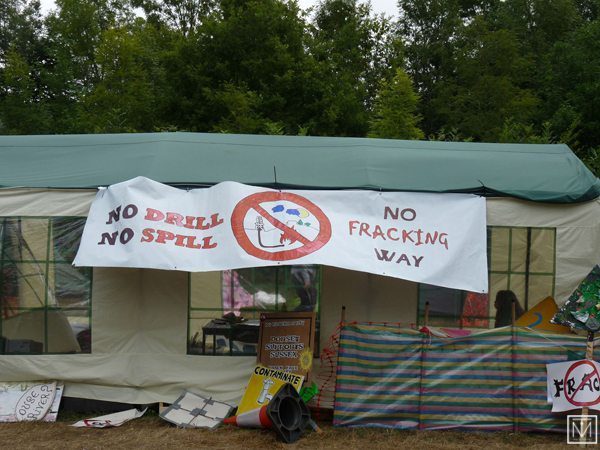
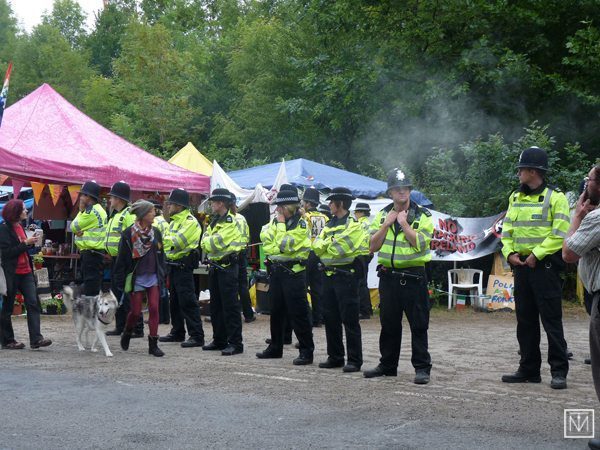
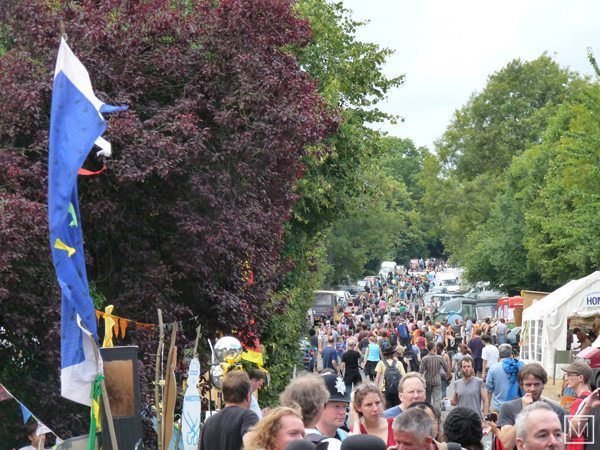
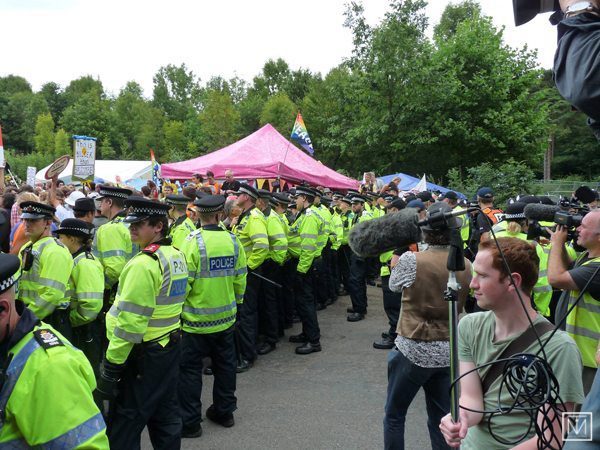
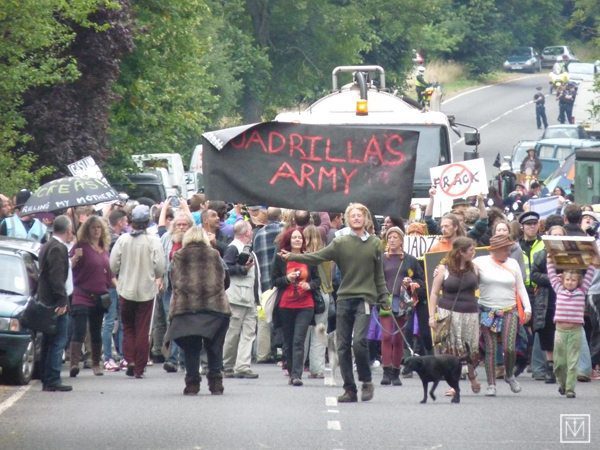



















![L'Esprit comique [Der komische Geist], René Magritte, 1928. Courtesy Sammlung Ulla und Heiner Pietzsch, Berlin © 2025, ProLitteris, Zurich Photo Credit: Jochen Littkemann, Berlin](https://b276103.smushcdn.com/276103/wp-content/uploads/2025/07/ew11_0098489_2025-05-12_web-140x174.jpg?lossy=1&strip=0&webp=1)

